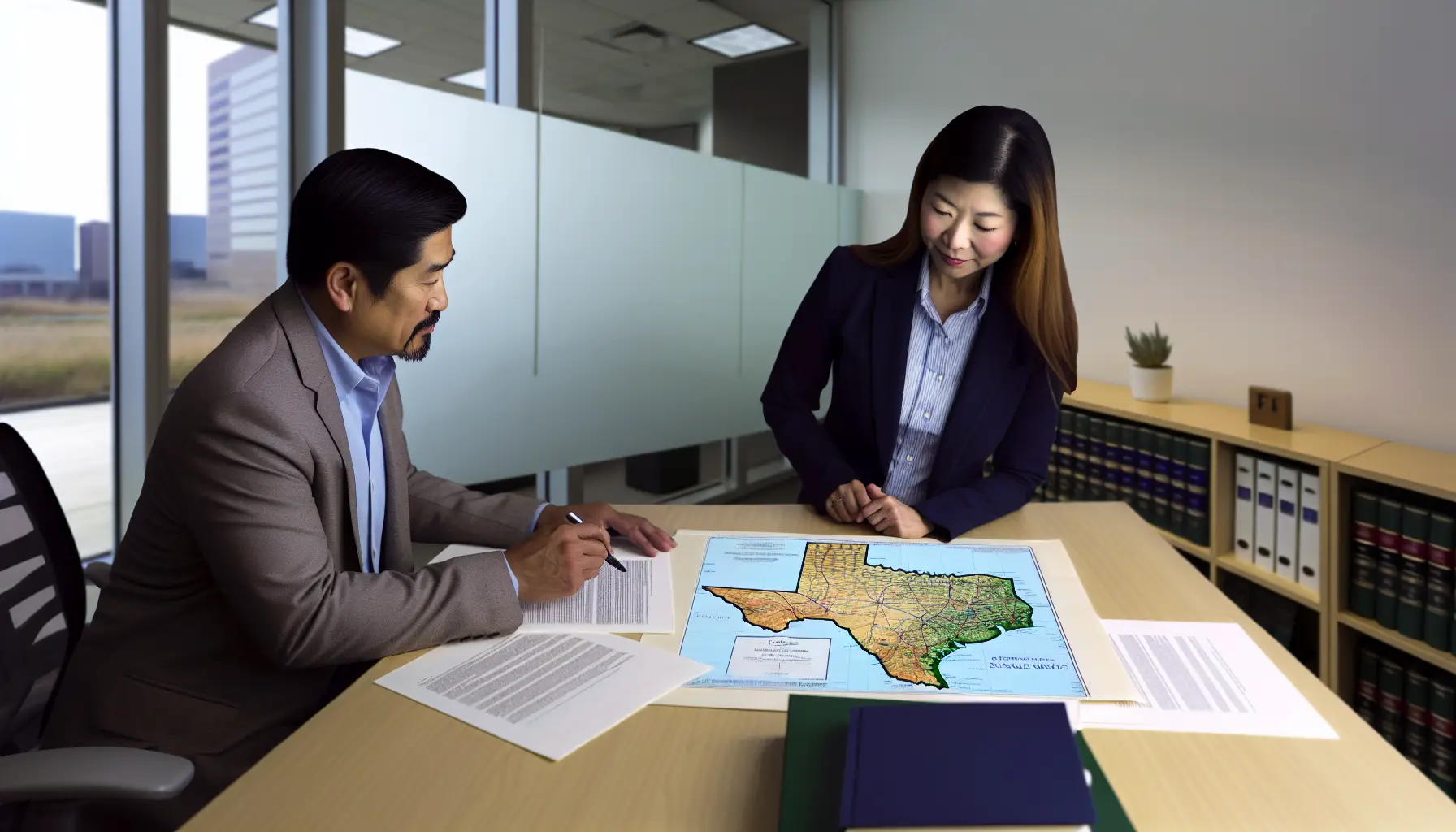Understanding the costs associated with lawyer consultation fees can be critical in navigating the often complex legal landscape. By exploring various factors that influence these fees, clients can better prepare themselves financially and make informed decisions when seeking legal advice. This guide aims to illuminate the intricacies of attorney fees, providing insights that will empower you to manage expectations and budget effectively.
In This Article:
-
- Factors Influencing Lawyer Consultation Costs in Texas
- Understanding Lawyer Consultation Fees
- The Role of Legal Specialization and Experience
- Geographic Location and Its Impact on Costs
- Law Firm Size and Prestige: How It Affects Fees
- Billing Methods: Hourly Rate, Flat Fee, and Contingency
- Additional Costs Beyond the Consultation Fee in Texas
- The Importance of Fee Agreements and Transparency
- Free Initial Consultations: What to Expect
- Negotiating Fees and Cost-Saving Strategies
- Alternative Legal Service Options and Their Pricing
- Conclusion: Preparing for Your Lawyer Consultation in Texas
Factors Influencing Lawyer Consultation Costs in Texas
Navigating the legal landscape can be daunting. One of the most common concerns is the cost of consulting with a lawyer.
Understanding the factors influencing lawyer consultation costs can help you budget effectively. It can also help you make informed decisions when seeking legal advice.
When considering the costs associated with hiring a lawyer for consultations and legal services, several key factors come into play. Understanding these can help you anticipate potential expenses and ensure you’re making informed decisions. Here’s a breakdown:
Type of Legal Work
The nature of the legal issue at hand significantly influences how much a lawyer might charge. For instance, attorneys practicing personal injury or criminal law often provide free initial consultations as a way to assess mutual interest in pursuing a case together. However, in areas like family law or probate, where consultations might involve detailed legal guidance, expect higher charges. This is because these sessions often require sharing specialized legal advice and begin the formation of a client-attorney relationship.
Attorney’s Experience Level
Experience is a valuable asset in legal matters. Lawyers who have been in practice longer tend to charge more because their expertise comes with greater demand. An experienced attorney often commands higher fees due to their vast knowledge and proven track record, providing clients with confidence in their capabilities. Conversely, newer attorneys might offer more competitive rates as they establish their practice.
Complexity and Amount of Work
Each legal case presents unique challenges, which directly impact costs. The complexity of a case determines how much work is involved, both in preparation and in the consultation itself. The more intricate the legal issue, the more time and expertise are required, leading to higher fees. Simple matters may incur lower costs due to reduced demand on the attorney’s resources and time.
Some other factors that influence attorney fees in Texas are:
- Specialization: Lawyers focusing on niche areas, such as oil and gas law, often charge more due to their expertise.
- Geographic Location: Legal services in cities like Dallas or Houston usually cost more than in rural areas of Texas.
- Law Firm Size: Larger, prestigious firms often have higher fees due to their reputation and resources.
This article aims to shed light on these factors. It will provide insights into attorney fees, consultation prices, and what to expect when seeking legal services. By the end, you’ll be better equipped to navigate the financial aspects of hiring a lawyer.
Understanding Lawyer Consultation Fees
Consultation fees often cover the initial meeting with a lawyer. During this session, the attorney assesses your case and advises on possible legal solutions.
These fees can vary widely based on several factors. The structure of these fees varies:
- Hourly Rates: Charged for each hour spent on your case.
- Flat Fees: A set price for specific services.
- Contingency Fees: The lawyer is paid only if you win your case.
A well-defined fee structure ensures that clients know what to expect from the outset.
Typically, a consultation fee includes time spent discussing your case, reviewing relevant documents, and strategizing next steps. Some lawyers may offer an initial consultation at no charge, while others charge a set fee.
Factors influencing lawyer consultation fees include:
- Experience level and expertise of the lawyer
- Complexity and urgency of the legal issue
- Specific legal service type (e.g., family law, corporate law)
It’s crucial to ask what’s included in the consultation price. Knowing what you’re paying for can prevent misunderstandings later.
Understanding these fees allows you to make informed decisions. It also helps in planning financially for ongoing legal services. Comprehensive discussions about fees are an essential part of the client-lawyer relationship.
The Role of Legal Specialization and Experience
A lawyer’s specialization significantly impacts consultation costs. Attorneys focused on niche areas, like intellectual property or maritime law, often charge higher fees. Their expertise in specific legal fields justifies these rates.
Experience is another key factor. Lawyers with decades of practice may command higher fees than those new to the profession. Clients often value seasoned lawyers for their refined skills and proven track records.
Specialization and experience often go hand in hand. Together, they drive up consultation costs but provide clients with expert guidance. Clients should weigh the value of specialized knowledge against the associated costs when choosing a lawyer. Opting for experienced professionals might be costly initially, but the long-term benefits can outweigh the expense.
Geographic Location and Its Impact on Costs
Where you seek legal advice matters. Lawyer consultation costs vary significantly by geographic location. Big cities tend to have higher rates compared to rural areas.
Urban attorneys often face higher operational costs. Rent, staff salaries, and other overheads in large cities contribute to increased fees. In contrast, rural lawyers may offer more affordable services due to lower expenses.
The local market also influences pricing. Areas with high demand for legal services tend to have increased rates. Conversely, regions with more lawyers or less demand might offer competitive prices. Clients should consider these location-based factors when budgeting for legal services. An understanding of geographic impact on costs helps in making informed decisions.
Law Firm Size and Prestige: How It Affects Fees
The size of a law firm can significantly influence attorney fees. Large, well-established firms often charge more for consultations. Their reputation and resources come at a premium price.
Prestige is another factor in cost. Renowned firms, known for high-profile cases, may demand higher fees. Clients pay not only for legal advice but also for the firm’s prestigious brand.
Small or solo practices might be more budget-friendly. These firms usually have lower overhead costs. Despite less prestige, many small firms provide excellent legal services at competitive prices. Clients should balance the need for reputation with their budget when selecting legal representation.
Billing Methods: Hourly Rate, Flat Fee, and Contingency
Billing methods vary, impacting the consultation price significantly. Understanding these methods helps clients plan financially. Each method has its own structure and suits different legal needs.
The hourly rate is a common billing method. Lawyers charge for each hour or part thereof they work on a case. This method suits cases with unclear timelines and complexities. Clients should ask for estimated hours to better grasp potential costs.
The flat fee method offers predictability. Clients pay a fixed amount for specific legal services, regardless of time spent. This is often used for routine services, like drafting a will or handling a minor traffic offense.
The contingency fee method is unique. The lawyer only gets paid if the client wins the case. Usually applied in personal injury or accident cases, the fee is a percentage of the settlement. This eliminates upfront costs but can result in a significant share of the award going to the attorney.
In summary, each billing method has pros and cons:
- Hourly Rate: Pay per hour.
- Flat Fee: Set price for services.
- Contingency: No win, no fee.
Choosing the right method depends on case type and client preferences. It’s essential to discuss billing methods in advance for budget clarity.
Additional Costs Beyond the Consultation Fee in Texas
When hiring a lawyer, consultation fees are just the beginning. Many clients face additional costs that can add up quickly. It’s crucial to understand what these costs might entail.
Court fees are common additional expenses. These can include charges for filing legal documents, serving papers, or obtaining copies of records. Each step in the legal process might carry its own set of fees, which vary by jurisdiction.
Another potential cost is for expert witnesses. In complex cases, lawyers may require the testimony of a specialist. Hiring these professionals can be costly but may be necessary to strengthen a case.
Clients should also consider administrative costs. These can include expenses for mailings, phone calls, or office supplies related to a case. While often overlooked, they can affect the overall cost of legal services. Always ask for a breakdown of these potential expenses to avoid surprises. Clear communication with your lawyer about expected costs is vital for financial preparedness.
The Importance of Fee Agreements and Transparency
Fee agreements are crucial when consulting with a lawyer. They provide a clear understanding of the costs involved. This document outlines what clients can expect financially from their legal representation.
Transparency in billing practices is vital. Clients need to know how and why they’re being charged. This openness helps build trust between the lawyer and the client. Clients should feel comfortable asking questions about the fees detailed in the agreement.
A well-drafted fee agreement covers all aspects of potential expenses. It should include the lawyer’s hourly rate, any retainer requirements, and additional costs. Ensure the agreement is detailed and leaves no room for confusion. A clear agreement helps avoid disputes over costs in the long run. Always review the fee agreement carefully and discuss it with your lawyer. Understanding the agreement helps ensure there are no surprises later on in the legal process.
Free Initial Consultations: What to Expect
Many lawyers offer free initial consultations. This session allows you to discuss your legal concerns without immediate cost. It’s a chance to assess if the lawyer is a good fit for your needs.
During this consultation, expect to share relevant details about your case. The lawyer will outline potential strategies and provide a general sense of any costs involved. However, detailed legal advice might be reserved for paid consultations. Use this opportunity to ask questions about the lawyer’s experience, expertise, and fee structures. This helps in making an informed decision regarding your legal representation.
Negotiating Fees and Cost-Saving Strategies
Understanding attorney fees can empower clients to negotiate better deals. Not all fees are set in stone, and discussing them could lead to more favorable terms. Many lawyers are open to fee adjustments based on the case’s complexity or your financial situation.
Clients can explore various cost-saving strategies to make legal services more affordable. Requesting a flat fee for specific services might lead to more predictable costs. Limited scope representation, where the lawyer handles only select parts of your case, can also reduce expenses.
Effective communication with your lawyer is key to avoiding misunderstandings about costs. Be clear about your budget and ask for detailed billing. This practice helps in identifying unnecessary charges. Consider asking about bundled services or payment plans which can break down costs over time. Remember, negotiating and strategizing can make high-quality legal services more accessible without compromising on the quality of representation.
Alternative Legal Service Options and Their Pricing
Alternative legal service providers offer different pricing models compared to traditional law firms. Online platforms and virtual consultations often come at a lower cost. These services can provide legal documents and guidance without the high expenses of a full-service law office.
Legal aid clinics and non-profit organizations can be valuable resources for those unable to afford typical attorney fees. They often operate on sliding scale fees based on income, offering access to necessary legal help for less. For some, pro bono work by lawyers may also be available, providing representation without charge.
Mediation and arbitration are other alternatives to consider. They frequently cost less than a court trial. These methods focus on resolving conflicts outside of the courtroom, lowering overall legal expenses. Exploring these options can significantly cut costs while ensuring you still get the legal assistance you need. It’s essential to weigh these alternatives based on your specific legal situation.
Conclusion: Preparing for Your Lawyer Consultation in Texas
Understanding what impacts lawyer consultation costs helps in making informed decisions. Knowing the factors can prepare you financially and mentally for the consultation.
By considering specialization, location, and billing methods, you can budget efficiently. Exploring alternative legal services might also offer cost-effective solutions. Taking these steps ensures you are ready for the financial commitment involved in consulting a lawyer.
Frequently Asked Questions (FAQs)
What factors impact lawyer costs for consultations and legal services?
Many factors affect the cost of lawyer consultations and legal services. These include the type of legal work, the attorney’s experience, and how complex the case is. Specialized areas like corporate or patent law often command higher fees, while personal injury lawyers may offer free consultations. More experienced attorneys generally charge higher rates due to their expertise and track record. Complex legal matters require more preparation and time, leading to increased consultation costs. Understanding these factors can help you plan and budget for legal services effectively.
What are the typical lawyer hourly fees for consultations?
Lawyer consultation fees vary based on location, specialization, and experience. At our firm, remote consultations are priced at $450, while in-person consultations cost $650. Fees can fluctuate depending on the complexity of the case and the attorney’s expertise. In high-demand legal fields, consultation rates may be higher due to the specialized knowledge required. It’s always best to confirm rates upfront to avoid unexpected costs.
How does the amount of work involved in a case affect consultation costs?
The complexity and workload of a case directly impact consultation fees. Simple legal matters need less preparation. This leads to lower consultation costs. In contrast, complex cases require more detailed analysis and research. Attorneys handling intricate legal issues often charge higher fees to reflect the additional time and expertise required. If a case is expected to involve extensive legal work, the initial consultation cost may also reflect future demands. Understanding the workload involved can help you anticipate overall legal expenses.
What are the typical lawyer consultation fee structures?
Lawyers use different consultation fee structures, including free consultations, hourly rates, and flat fees. Free consultations are common in personal injury and criminal law, where lawyers assess the case before taking it on. Hourly rates usually range from $450 for remote meetings to $650 for in-person meetings. This is common in family law and estate planning. Some lawyers offer flat fees, which provide cost certainty but may not always reflect the complexity of the case. Choosing the right structure depends on the type of legal service needed.
How does an attorney’s experience level influence their consultation fees?
An attorney’s experience plays a significant role in determining consultation fees. Highly experienced lawyers with a strong reputation often charge higher rates due to their expertise and past successes. Their deep knowledge of the law allows them to handle cases more efficiently, justifying premium pricing. On the other hand, less experienced attorneys or those newly admitted to the bar may offer lower rates to attract clients. While cost is important, experience can be a valuable asset in complex legal matters.
How does the type of legal work affect consultation fees?
The area of law significantly impacts consultation fees, as different legal fields require varying levels of expertise. Personal injury and criminal defense lawyers often offer free consultations. These cases usually work on contingency or retainer agreements. Real estate law and probate attorneys may charge for consultations. They give direct legal advice during the meeting. Specialized areas like intellectual property or corporate law often have higher consultation fees. This is because the legal work is more complex.
How much does it cost to talk to a lawyer?
The cost of speaking with a lawyer depends on factors like legal specialization, location, and consultation structure. At our firm, remote consultations are $450, while in-person consultations cost $650. Some attorneys offer free initial consultations, while others charge by the hour or a flat fee. Flat-fee consultations provide a set price for legal advice, which can be beneficial for clients looking for cost predictability. Always confirm pricing before scheduling a consultation to avoid unexpected expenses.
How do lawyers charge for consultations using an hourly rate?
Lawyers charging hourly rates bill clients for the time spent discussing their case. Clients are informed of the hourly rate before the meeting, ensuring transparency. Most legal consultations last about an hour, though complex discussions may require additional time and higher costs. Family law, estate planning, and business law attorneys often use hourly billing, as these consultations involve direct legal advice. Our standard hourly rates are $450 for remote consultations and $650 for in-person meetings.
What are the advantages and disadvantages of a flat fee rate for consultations?
Flat fee consultations provide cost certainty, allowing clients to know the exact amount they will pay upfront. This can be beneficial for budgeting and eliminates concerns over hourly billing. However, if the consultation is shorter than expected, clients may feel they overpaid. Attorneys benefit from guaranteed payment but risk underestimating the time needed for complex discussions. Flat fees typically range from $450 for remote consultations to $650 for in-person meetings, depending on the legal field and attorney’s experience.
What is a free lawyer consultation, and in what areas of law is it common?
A free consultation is an initial meeting where a lawyer assesses a case without charging a fee. In personal injury, criminal defense, and some family law cases, lawyers see if they match well with the client. These consultations usually do not include detailed legal advice. Instead, they provide a chance to talk about the case and possible representation. At Daughtrey Law Firm, we don’t offer a free consultation.
How do average attorney fees vary by state?
Attorney fees vary based on location, cost of living, and legal market demand. States with higher living costs, such as California and New York, tend to have higher lawyer fees, often exceeding $400 per hour. Mid-range states like Texas and Illinois generally charge between $250 and $500 per hour. Rural areas or states with lower costs of living may have more affordable legal rates, sometimes starting as low as $150 per hour. At our firm, consultation fees are $450 for remote meetings and $650 for in-person sessions. Researching regional averages can help clients find the best legal services within their budget.






















